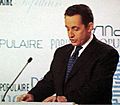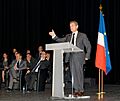Nicolas Sarkozy facts for kids
Quick facts for kids
Nicolas Sarkozy
|
|||||||||||||||||||||||||||||||||||||||||||||||||||||||||||||||||||||||||||||||
|---|---|---|---|---|---|---|---|---|---|---|---|---|---|---|---|---|---|---|---|---|---|---|---|---|---|---|---|---|---|---|---|---|---|---|---|---|---|---|---|---|---|---|---|---|---|---|---|---|---|---|---|---|---|---|---|---|---|---|---|---|---|---|---|---|---|---|---|---|---|---|---|---|---|---|---|---|---|---|---|
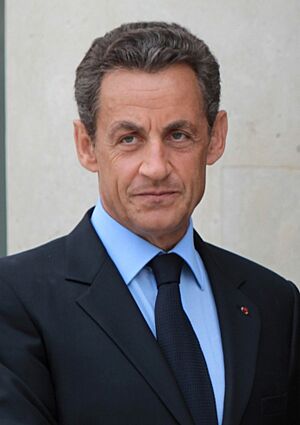
Sarkozy in 2011
|
|||||||||||||||||||||||||||||||||||||||||||||||||||||||||||||||||||||||||||||||
| 23rd President of France | |||||||||||||||||||||||||||||||||||||||||||||||||||||||||||||||||||||||||||||||
| In office 16 May 2007 – 15 May 2012 |
|||||||||||||||||||||||||||||||||||||||||||||||||||||||||||||||||||||||||||||||
| Prime Minister | François Fillon | ||||||||||||||||||||||||||||||||||||||||||||||||||||||||||||||||||||||||||||||
| Preceded by | Jacques Chirac | ||||||||||||||||||||||||||||||||||||||||||||||||||||||||||||||||||||||||||||||
| Succeeded by | François Hollande | ||||||||||||||||||||||||||||||||||||||||||||||||||||||||||||||||||||||||||||||
|
|||||||||||||||||||||||||||||||||||||||||||||||||||||||||||||||||||||||||||||||
| Additional positions | |||||||||||||||||||||||||||||||||||||||||||||||||||||||||||||||||||||||||||||||
| (see § Offices and distinctions) | |||||||||||||||||||||||||||||||||||||||||||||||||||||||||||||||||||||||||||||||
| Personal details | |||||||||||||||||||||||||||||||||||||||||||||||||||||||||||||||||||||||||||||||
| Born |
Nicolas Paul Stéphane Sarközy de Nagy-Bocsa
28 January 1955 Paris, France |
||||||||||||||||||||||||||||||||||||||||||||||||||||||||||||||||||||||||||||||
| Political party | The Republicans (2015–present) | ||||||||||||||||||||||||||||||||||||||||||||||||||||||||||||||||||||||||||||||
| Other political affiliations |
Union of Democrats for the Republic (1974–1976) Rally for the Republic (1976–2002) Union for a Popular Movement (2002–2015) |
||||||||||||||||||||||||||||||||||||||||||||||||||||||||||||||||||||||||||||||
| Spouses |
Marie-Dominique Culioli
(m. 1982; div. 1996)Cécilia Ciganer-Albéniz
(m. 1996; div. 2007) |
||||||||||||||||||||||||||||||||||||||||||||||||||||||||||||||||||||||||||||||
| Children | 4, including Jean and Louis | ||||||||||||||||||||||||||||||||||||||||||||||||||||||||||||||||||||||||||||||
| Education | Paris West University Nanterre La Défense (MA, DEA) Sciences Po (attended) |
||||||||||||||||||||||||||||||||||||||||||||||||||||||||||||||||||||||||||||||
| Signature |  |
||||||||||||||||||||||||||||||||||||||||||||||||||||||||||||||||||||||||||||||
Nicolas Sarkozy (born 28 January 1955) is a French politician who was the President of France from 2007 to 2012.
Before becoming president, he held several important government jobs. He was the Minister of the Interior, which meant he was in charge of the country's police and security. He was also the Minister of Finance, where he managed the nation's money.
As president, he led France during major world events like the 2008 financial crisis. He also made changes to France's universities and the rules for retirement. In 2008, he married the singer and model Carla Bruni. After his presidency ended in 2012, he retired from public life.
Contents
Early Life and Family
Nicolas Sarkozy was born in Paris. His father, Pál Sárközy, was from a noble family in Hungary. His mother, Andrée Mallah, was of Greek-Jewish and French Catholic background. His parents divorced when he was young, and he was mostly raised by his mother and grandfather.
Sarkozy has said that his childhood experiences helped shape who he became. He felt that he had to work harder than others to prove himself.
He went to university and earned degrees in law. After his studies, he became a lawyer, specializing in business and family law.
Sarkozy has four children. He is married to singer and former model Carla Bruni. They have a daughter named Giulia, who was born in 2011 while he was president.
Beginning a Career in Politics
Sarkozy's political career started when he was 23 years old. He became a city councillor in Neuilly-sur-Seine, a suburb of Paris. A few years later, in 1983, he was elected mayor of the same town. He was the youngest mayor in France of a town with more than 50,000 people.
In 1993, he became Minister for the Budget in the French government. He was also the government's spokesperson, which meant he explained the government's plans to the public. During this time, he became known for his energy and ambition.
Over the next several years, Sarkozy held other important roles. He was appointed Minister of the Interior in 2002. In this job, he focused on improving road safety and introduced more speed cameras. He later became the leader of his political party, the Union for a Popular Movement (UMP).
His supporters liked his direct way of speaking and his ideas for changing France. He was seen as a strong and skilled politician.
The 2007 Presidential Election
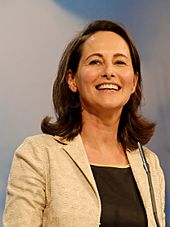
In 2007, Nicolas Sarkozy decided to run for president of France. He was chosen as the candidate for his party, the UMP. During his campaign, he promised to modernize the country and make big changes. He talked about the importance of work, respect, and national pride.
His main opponent was Ségolène Royal from the Socialist Party. The election was held in two rounds. In the first round on April 22, Sarkozy received the most votes.
In the second round on May 6, he won the election with over 53% of the vote. In his victory speech, he promised to be the president of all French people and to bring the country together.
Presidency of France (2007–2012)
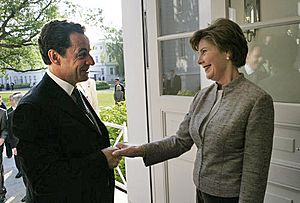
Nicolas Sarkozy officially became president on 16 May 2007. He appointed François Fillon as his Prime Minister. His government included people from different political backgrounds, which was unusual for France.
Domestic Policy
One of Sarkozy's goals was to change the French economy. His government passed laws to lower taxes, especially the inheritance tax. He also changed the rules about the 35-hour work week, making it easier for people to work overtime and earn more money.
He also led reforms of French universities and the pension system, which sets the rules for when people can retire.
His presidency was marked by the global financial crisis of 2008. He worked with other world leaders to respond to the crisis and protect the French economy. He said that governments needed to play a bigger role in controlling the markets.
Foreign Policy
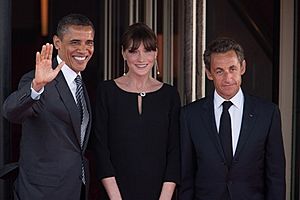
Sarkozy was very active in international affairs. He worked to build stronger relationships with countries like the United States and the United Kingdom.
When France held the presidency of the European Union Council in 2008, he played a key role in leading the EU. He helped negotiate a ceasefire during the war between Russia and Georgia. He also pushed for the EU to set goals for fighting global warming.
In 2011, a civil war began in Libya. Sarkozy was one of the first world leaders to call for Libyan leader Muammar Gaddafi to step down. France, along with other countries, took part in a military operation to protect civilians in Libya.
2012 Election and Retirement
In 2012, Sarkozy ran for a second term as president. His main opponent was François Hollande of the Socialist Party. After a tough campaign, Sarkozy lost the election to Hollande.
After his defeat, he announced he was leaving politics. He made a brief return in 2014 to lead his political party, which was renamed The Republicans. In 2016, he tried to become the party's candidate for the next presidential election but was not successful. After this, he retired from political life for good.
After leaving office, Sarkozy faced several legal challenges related to his time as a politician. These matters have been a focus of his life after the presidency.
Images for kids
-
Sarkozy as Minister of the Interior with U.S. Secretary of State Condoleezza Rice in 2006.
-
President Sarkozy with the President of Brazil, Dilma Rousseff.
-
Sarkozy with British Prime Minister David Cameron in 2010.
See also
 In Spanish: Nicolas Sarkozy para niños
In Spanish: Nicolas Sarkozy para niños
- Robert Bourgi


